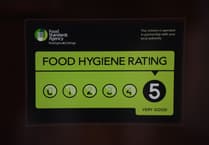Changes to Westminster constituencies will see one MP representing a 75-mile ward which would nearly stretch from Narberth to north of Aberystwyth.
The Boundary Commission for Wales’ Final Recommendations report has been laid by the Speaker of the House of Commons.
The Commission’s Final Recommendations will now take effect automatically, without the need for parliamentary or government approval, from the next scheduled General Election.
It follows a Westminster vote to cut the number of Welsh MPs from 40 to 32; each constituency proposed by the Commission must contain between 69,724 and 77,062 voters, with the exception of Ynys Mon.
The proposals include a new Ceredigion Preseli constituency, joining parts of Preseli Pembrokeshire with Ceredigion, with a road distance of nearly 75 miles from the extreme north to southwest of the new constituency.
Ceredigion Preseli would join parts of the seat currently held by Conservative Stephen Crabb with the seat held by Plaid Cymru’s Ben Lake.
The Commission has made minor changes to previous proposals, removing St Davids, Solva and Letterston from the proposed Ceredigion Preseli constituency and including the Maenclochog ward instead.
Other parts of Preseli Pembrokeshire would be rebranded as part of a new Mid and South Pembrokeshire constituency, replacing parts of the former Carmarthen West and Pembrokeshire South.
Mid and south Pembrokeshire, under the changes, would have the largest number of electors of any of the constituencies in Wales, at 76,820.
Commenting on the laying of the Final Recommendations report, Shereen Williams MBE OStJ DL, Secretary to the Boundary Commission for Wales said: “The Commission is delighted that its Final Recommendations report has been laid by the Speaker.
“It is our firm belief that these recommendations represent the best way to create 32 constituencies in Wales which meet the requirements of the Act, including taking account of geography and local ties.
“Though managing a significant reduction in the number of constituencies is never an easy task for a Boundary Commission, it has been made significantly easier thanks to the number and quality of representations we have received from the public, from Members of Parliament, from Political Parties, and from Principal Councils across Wales.
“The Commission would like to put on record its thanks to everyone who took part in the Review and strengthened the recommendations.”




